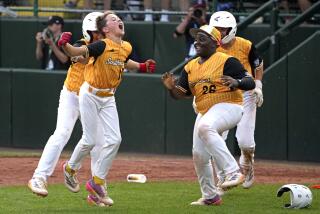Little League replay policy may be worth a second look for majors
- Share via
Reporting from South Williamsport, Pa. — It was a game that would have been over before it was over.
Last week at the Little League World Series, Taiwan’s players were happily running off the baseball field, celebrating what they thought was a 20-0 win over Aruba.
But there is a rule here: The final play of every game is automatically looked over by a replay official. Upon further review, what looked like a game-ending double play really wasn’t. An Aruba player had slid under a tag.
Given new life, Aruba rallied, putting together three consecutive singles and breaking the shutout before making another out — the real final out.
The final score was recorded as an only slightly more respectable 20-3. So was all the hullabaloo worth it?
“Absolutely,” said Nomar Garciaparra, a former Little Leaguer who became an accomplished major leaguer and is now a commentator for ESPN at the Little League World Series.
“It’s about getting the call right,” Garciaparra said Tuesday. “We have the technology, let’s use it. And we should expand it to the big leagues right now. There’s so much at stake at the major league level. Let’s get it right.”
Although Major League Baseball and the Little League World Series have wordy documents explaining how video replay can be employed, the short explanation is that in the majors only home run calls — over the wall or not; fair or foul — can be reviewed and reversed.
At the LLWS, just about everything except for balls and strikes can be reviewed and, as is the rule in the National Football League, each team has the right to ask for replay to be used in challenging a call.
In the NFL, each side gets two challenges per game, plus a third if both challenges are used successfully. In Little League, each manager is allowed two review requests in a regulation six-inning game. Other than balls and strikes, the manager can ask for just about anything to be reviewed. If the manager is right, he keeps the challenges. Each time he’s wrong he loses one. If the game goes to extra innings, each team gets only one challenge from that point on.
The LLWS first instituted limited review — mostly involving home runs or balls hit at the outfield fence — in 2008.
In 2010, the organization decided to expand the system to other plays and give the managers the opportunity to ask for a review. Umpires can also ask for a review if they think they need help or may have missed a call.
“I think that’s a good thing,” said umpire Toby Hoy, a Corona native working the LLWS this year. “Let’s make sure we get it right.”
Dan Kirby, the replay official here, said concerns about the system taking too much time or ruining momentum have proved unfounded.
Kirby said that in 2010, half of the 18 plays reviewed during the 10-day tournament resulted in an overturned call.
Entering play Tuesday, Little League said 15 plays had been reviewed this year but the number of successful challenges was not available.
Review can happen only because ESPN is televising every game.
Tom McNeeley, ESPN’s coordinating producer for the LLWS, said providing the video for review is “a big responsibility.”
McNeeley said two associate directors are in trucks, one at Volunteer Field and the other at Lamade Stadium, the LLWS’ two game venues.
“They’re so immersed in the monitors,” McNeeley said, “sometimes before I’m even asked for a replay, they’re talking to my tape operators and by the time the umpire is calling time out, we’ve got multiple angles ready to go.
“We’re very conscious of being speedy. I think in this case, Little League, ESPN, umpires, managers, players, their families, everyone wants it to be right. And as the system has progressed I think the comfort level has grown.”
Garciaparra is emphatic that the Little League model is needed in Major League Baseball. He points to the no-hitter taken away last year from Detroit Tigers pitcher Armando Galarraga when umpire Jim Joyce botched a call at first base on what should have been the final out. Instead, a hit was awarded.
“With replay, Jim, who is one of the best umpires in the game, could sleep at night,” Garciaparra said. “Let’s just get there. The kids have got it right.”
twitter.com/mepucin
More to Read
Go beyond the scoreboard
Get the latest on L.A.'s teams in the daily Sports Report newsletter.
You may occasionally receive promotional content from the Los Angeles Times.










